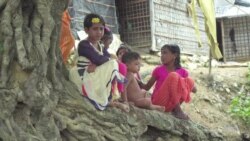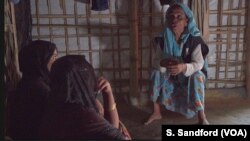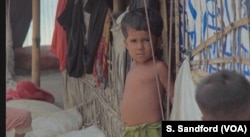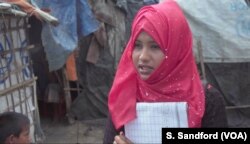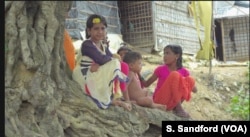Inside a crowded bamboo hut, a group of women, some holding babies, listens intently as an older Rohingya woman flails her arms in the air, emphasizing the virtues of women’s hygiene.
Fifty-year-old Nur Begum, who was among the mass exodus of Rohingya from Myanmar last fall, is one of a team of about 20 health counseling volunteers working for UNICEF’s local NGO partner Pulse who offer up their knowledge to the female population in Balukhali camp.
Nur’s specialty is childbirth, breastfeeding, and just about anything else that a new mom would think about asking.
On this day, a 14-year-old, who goes by the name Aisha, has a question about sanitary napkins, or in this case, the handling of cotton clothes used by some of the camp teens who are unable to access tampons.
“We have to use a clean rag to clean ourselves during our period and after we finish we then wash it out in a toilet,” Aisha said.
During their first period, Rohingya girls are often confined to their huts and costly hygiene pads are not always available.
Like a second mother
It’s a sensitive topic, but there is an ease in the air as the teen listens to Nur’s advice about the physical health risks of poor menstrual hygiene.
Aisha says that Nur is like a second mother to her, as her own mom died about four months ago from an unknown illness.
The Rohingya grandmother is indeed a breath of fresh air in a setting where the comforting words of a friendly neighbor help erase the tension and trauma.
“Nur Begum’s presence is one of reassurance for young moms and teenagers,” said UNICEF’s information officer Alastair Lawson-Tancred. “She relaxes the room with her charm and humor and gives out advice in a very nonjudgmental way.”
“The local volunteers are much more effective than foreign aid workers because they know the camps well and understand the customs of the Rohingya people,” Tancred explained, adding that about 75 percent of the mobile health consultants are Rohingya.
50 babies born each week
Maternal and infant health is an ongoing concern in the Rohingya refugee camps, where poverty and a lack of education can create health risks for new moms and their babies.
Every week about 50 babies are born into dire conditions with less than a quarter of mothers giving birth in a proper health facility.
More than 16,000 Rohingya babies were born in refugee camps and informal settlements in Cox’s Bazar, Bangladesh, in the first nine months since the massive Rohingya exodus from violence in Rakhine State, Myanmar, UNICEF reported in May.
Traditional norms and limited education have left many mothers with little knowledge of basic sexual and infant health care.
UNICEF is working with several local NGOs including SHED and Pulse to spread key information about women’s health.
Vital nutrition begins at birth, but many mothers are often unable to breastfeed because of stress and the poor quality of their food.
Leading aid groups recommend exclusive breastfeeding for at least the first six months of a child’s life, then continued feeding with solids until the age of 2.
Volunteers go into the camps to follow up with new parents who’ve been given special food supplements to increase their child’s weight.
“The children condition’s today is getting better since we gave meds and nutritional food, and afterwards we measured the body and there is growth,” said Sameela Kotima, an outpatient therapeutic volunteer, after she measures the arm of a toddler who was suffering from malnutrition a few weeks ago.
“It’s better than the first checkup as the child was in terrible condition when we first checked her,” Kotima said.
Taboo topics
The mobile health workers also counsel young women about taboo sexual health issues such as contraceptives.
While Nur is firm in her view that marriage before 18 is unacceptable, she also speaks about the options of birth control, a taboo subject in most Rohingya circles.
“The elderly tell us not to eat birth control pills or medicine to stop us from producing children,” said Natawan Mondool, a 38-year-old mother of eight who is among the afternoon gathering.
“They say it’s a sin to stop birth, so we listened to them and that’s why we had more children in our family, but now we realize that it’s not a good idea to have many children,” Mondool said.
“Now I teach my children to not have more children and use birth control.”




